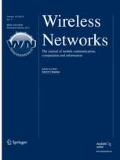Abstract
In the past, security protocols including key transport protocols are designed with the assumption that there are two parties communication with each other and an adversary tries to intercept this communication. In Delay/Disruption Tolerant Networking (DTN), packet delivery relies on intermediate parties in the communication path to store and forward the packets. DTN security architecture requires that integrity and authentication should be verified at intermediate nodes as well as at end nodes and confidentiality should be maintained for end communicating parties. This requires new security protocols and key management to be defined for DTN as traditional end-to-end security protocols will not work with DTN. To contribute towards solving this problem, we propose a novel Efficient and Scalable Key Transport Scheme (ESKTS) to transport the symmetric key generated at a DTN node to other communicating body securely using public key cryptography and proxy signatures. It is unique effort to design a key transport protocol in compliance with DTN architecture. ESKTS ensures that integrity and authentication is achieved at hop-by-hop level as well as end-to-end level. It also ensures end-to-end confidentiality and freshness for end communicating parties. This scheme provides a secure symmetric key transport mechanism based on public key cryptography to exploit the unique bundle buffering characteristics of DTN to reduce communication and computation cost .












Similar content being viewed by others
References
Fall, K., & Farrell, S. (2008). DTN: An architectural retrospective. IEEE Journal on Selected Areas in Communications, 26(5), 828–836. doi:10.1109/JSAC.2008.080609.
Caini, C., Cruickshank, H. S., Farrell, S., & Marchese, M. (2011). Delay- and Disruption-Tolerant Networking (DTN): An alternative solution for future satellite networking applications. Proceedings of the IEEE, 99(11), 1980–1997.
Hur, J., & Kang, K. (2013). Secure data retrieval for decentralized disruption tolerant military networks. IEEE/ACM Transactions on Networking. doi:10.1109/TNET.2012.2210729.
Scott, K., & Burleigh, S. (2007). RFC 5050, Bundle protocol specifications. IRTF DTN Research Group. http://tools.ietf.org/html/rfc5050.
D’Souza, R. J., & Jose, J. (2010). Routing approaches in delay tolerant networks: A survey. International Journal of Computer Applications, 1(17), 0975–8887.
Farrell, S., Weiss, H., Symington, S., & Lovell, P. (2011). Bundle security protocol specification. SPARTA, Inc. http://tools.ietf.org/html/rfc6257.
Farrell, S., & Cahill, V. (2006). Security considerations in space and delay tolerant networks. In 2nd IEEE international conference on space mission challenges for information technology (SMC-IT’06) (pp. 29–38). Pasadena, CA: SMC-IT. doi:10.1109/SMC-IT.2006.66.
Farrell, S. (2007). DTN key management requirements. Internet-Draft, draft-farrell-dtnrg-km-00.
Symington, S. F., Farrell, S., Weiss, H., & Lovell, P. (2009). Bundle security protocol specification, draft-irtf-dtnrg-bundle-security-08, IETF draft. March 2009.
Farrell, S., Symington, S. F., Weiss, H., & Lovell, P. (2009). Delay-Tolerant Networking Security Overview, draft-irtf-dtnrg-sec-overview-06, IETF draft. March 2009.
Symington, S. F, Farrell, S., Weiss, H., & Lovell, P. (2011). Bundle Security Protocol Specification. IETF RFC 6257, experimental, May 2011.
Boyd, C., & Mathuria, A. (2003). Protocols for authentication and key establishment. Book: Springer.
Kim, S., Park, S., & Won, D. (1997). Proxy signatures, Revisited. In Y. Han, T. Okamoto, & S. Qing (Eds.), ICICS 1997, LNCS (Vol. 1334, pp. 223–232). Heidelberg: Springer. doi:10.1007/BFb0028478.
Lee, J. -Y., HeeCheon, J., & Kim, S. (2003). An analysis of proxy signatures: Is a secure channel necessary? In M. Joye (Ed.), Topics in cryptology—CT-RSA 2003 (Vol. 2612, pp. 68–79). Berlin/Heidelberg: Springer. doi:10.1007/3-540-36563-X_5.
Boldyreva, A., Palacio, A., & Warinschi, B. (2012). Secure proxy signatures for delegation of signing rights. Journal of Cryptology, 25(1), 57–115. doi:10.1007/s00145-010-9082-x.
Keränen, A., Kärkkäinen, T., & Ott, J. (2010). Simulating mobility and DTNs with the ONE (invited paper). JCM, 5(2), 92–105.
Keränen, A., Ott, J., & Kärkkäinen, T. (2009). The ONE simulator for DTN protocol evaluation. In Proceedings of the 2nd international conference on simulation tools and techniques for communications, networks and systems, SimuTools 2009, Rome, p. 55.
Spyropoulos, T., Psounis, K., & Raghavendra, C. S. (2008). Efficient routing in intermittently connected mobile networks: the multiple-copy cast. IEEE/ACM Transactions on Networking, 16(1), 63–76. doi:10.1109/TNET.2007.897962.
Spyropoulos, T., Rais, R. N. B., Turletti, T., Obraczka, K., & Vasilakos, A. V. (2010). Routing for disruption tolerant networks: taxonomy and design. Wireless Networks, 16(8), 2349–2370.
Vasilakos, A. V., Zhang, Y., & Spyropoulos, T. (2012). Delay tolerant networks: Protocols and applications. Boca Raton, FL: CRC Press.
Zeng, Y., Xiang, K., Li, D., & Vasilakos, A. V. (2013). Directional routing and scheduling for green vehicular delay tolerant networks. Wireless Networks, 19(2), 161–173.
Dvir, A., & Vasilakos, A. V. (2010). Backpressure-based routing protocol for DTNs. In SIGCOMM (pp. 405–406). ACM. doi:10.1145/1851182.1851233.
Author information
Authors and Affiliations
Corresponding author
Rights and permissions
About this article
Cite this article
Bhutta, M.N.M., Cruickshank, H.S. & Sun, Z. An Efficient, Scalable Key Transport Scheme (ESKTS) for Delay/Disruption Tolerant Networks. Wireless Netw 20, 1597–1609 (2014). https://doi.org/10.1007/s11276-014-0693-2
Published:
Issue Date:
DOI: https://doi.org/10.1007/s11276-014-0693-2




